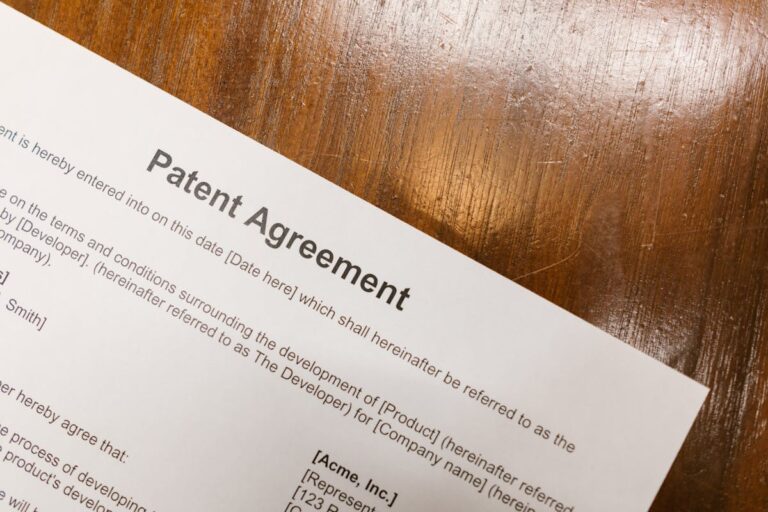When Should Houston Startups Consult an Intellectual Property Attorney?
Houston startups often wonder when to engage an intellectual property attorney. Ideally, this should occur during the ideation phase. Early consultation guarantees that innovations are safeguarded through appropriate patents, trademarks, or copyrights. Legal expertise aids in conducting market analyses and trademark searches to protect unique brand identifiers. As startups develop, ongoing legal guidance remains essential to steering through disputes and aligning IP strategies with business objectives. But what are the vital steps to contemplate next?
Understanding the Basics of Intellectual Property
Intellectual property (IP) serves as a critical asset for startups, encompassing intangible creations of the mind, such as inventions, designs, brand names, and creative works. Understanding intellectual property types is essential for startups to safeguard their innovations. Key types include patents, trademarks, copyrights, and trade secrets. Each type has distinct characteristics and legal protections. Patents, for instance, protect inventions and require a demonstration of novelty, utility, and non-obviousness to meet patent eligibility. Trademarks safeguard brand identifiers like logos and names, guaranteeing distinctiveness in the market. Copyrights cover original works of authorship, including literature and software. Trade secrets protect confidential business information. Maneuvering these categories effectively guarantees startups secure appropriate protections, facilitating competitive advantage and fostering long-term growth.
Identifying Unique Ideas Worth Protecting
Before a startup can effectively protect its intellectual property, it must first identify which ideas hold unique value. This process begins with rigorous idea generation, where creativity and innovation are encouraged. Once ideas are generated, the startup should conduct a thorough market analysis to determine the distinctiveness and potential impact of each idea. This involves evaluating competitors, understanding industry trends, and identifying gaps in existing solutions. By analyzing the competitive landscape, startups can ascertain which ideas offer a competitive advantage or fulfill unmet needs. Moreover, evaluating consumer demand and technological feasibility guarantees that selected ideas are not only unique but also viable. Working with a Trusted Intellectual Property Lawyer in Houston can help ensure this analytical approach is properly executed, allowing startups to prioritize ideas that warrant intellectual property protection, positioning themselves for future success.
The Role of IP in Product Development
In product development, intellectual property (IP) plays a pivotal role in safeguarding innovation and guaranteeing a competitive edge. By integrating IP considerations early in the product lifecycle, startups can strategically align their innovation strategy with market demands and legal protections. This alignment enables firms to identify and protect core technologies, designs, and processes that distinguish them from competitors. IP rights facilitate exclusive control over innovations, allowing companies to leverage these assets in licensing, partnerships, or litigation if necessary. Additionally, a well-defined IP portfolio can attract investors by demonstrating a commitment to protecting valuable innovations. Understanding the interplay between product development and IP guarantees that startups are not only innovating effectively but also securing their advancements against potential infringement and market dilution.
Timing Your Patent Application
When should a startup file its patent application to maximize legal protection and commercial advantage? Determining the best patent timing is pivotal for a startup’s application strategy. Filing too early may lead to incomplete disclosures, while filing too late could risk competitors seizing market opportunities. Startups should consider filing as soon as they have a well-defined invention that satisfies the requirements of novelty, non-obviousness, and usefulness. Strategically, filing a provisional patent application can secure an early filing date while providing additional time to refine the invention. Startups must balance the urgency to establish patent rights with the readiness of their innovation. Additionally, startups should conduct thorough prior art searches to guarantee the unique aspects of their invention are adequately protected, minimizing potential legal challenges.
Securing Trademarks for Your Brand
How can startups effectively protect their brand identity in a competitive market? Trademark registration is an essential step in achieving robust brand protection. Startups should begin by conducting a thorough trademark search to guarantee their desired brand elements are distinctive and not already in use. This preventive measure minimizes potential legal conflicts and enhances brand security. Consulting an intellectual property attorney can streamline the trademark registration process by ensuring compliance with legal requirements and addressing potential obstacles. By securing trademarks, startups can legally safeguard their brand identity, preventing unauthorized use by competitors. This legal protection not only reinforces the brand’s market position but also adds intangible value, making it an important consideration for startups aiming to establish and maintain a strong brand presence.
Addressing Copyright Concerns
In the domain of intellectual property, addressing copyright concerns is essential for startups aiming to protect their creative works from unauthorized use. An understanding of copyright laws not only safeguards original content but also aids in maneuvering the complex landscape of fair use, where the boundaries of permissible use are often nuanced. Consulting an intellectual property attorney can provide startups with strategic insights into these legal frameworks, ensuring both compliance and protection.
Protecting Creative Works
For Houston startups, safeguarding creative works through copyright protection is paramount to maintaining a competitive edge and ensuring intellectual property rights are upheld. Copyright provides a legal framework for securing creative ownership, allowing startups to protect their artistic expression from unauthorized use or distribution. This protection is essential in establishing a unique brand identity and fostering innovation. By registering copyrights, startups gain exclusive rights to reproduce, distribute, and display their works, which can include software, marketing materials, and original content. An intellectual property attorney can assist in maneuvering through the complexities of copyright registration, ensuring all creative works are adequately protected. Such legal counsel is critical in preventing infringement disputes and maintaining the integrity of a startup’s creative assets.
Navigating Fair Use
While maneuvering through the intricacies of intellectual property law, understanding the doctrine of fair use becomes essential for Houston startups. Fair use definitions provide a framework to determine whether an unlicensed use of copyrighted material is permissible. This legal doctrine is pivotal in balancing copyright limitations with the need for creativity and innovation. Startups must evaluate factors such as the purpose and character of the use, the nature of the copyrighted work, the amount used, and the effect on the market value. Engaging with an intellectual property attorney can aid startups in examining these factors accurately. By doing so, they can avoid potential legal pitfalls while leveraging existing copyrighted works to enhance their own offerings and maintain compliance with copyright laws.

Safeguarding Trade Secrets
Safeguarding trade secrets involves the critical steps of identifying valuable proprietary information and implementing robust protection measures. Startups must systematically assess which aspects of their operations, such as product formulas or business strategies, qualify as trade secrets and then establish measures like confidentiality agreements and restricted access protocols to protect these assets. Continuous monitoring for unauthorized access is essential to guarantee that the integrity of the trade secrets is maintained and potential breaches are promptly addressed.
Identifying Valuable Information
How can startups in Houston effectively identify the valuable information that constitutes their trade secrets? Startups should conduct a thorough audit to uncover valuable insights and innovative concepts central to their operations. This involves pinpointing proprietary algorithms, unique processes, customer lists, and strategic plans that provide a competitive edge. Identifying key personnel with access to such information is essential. A detailed examination of internal documents and communication can reveal patterns and data that qualify as trade secrets. Startups ought to prioritize information that, if disclosed, would harm their market position. By systematically categorizing and documenting these elements, startups can discern which assets warrant the designation of trade secrets, facilitating informed decisions on further protective actions.
Implementing Protection Measures
To effectively safeguard trade secrets, startups must implement an all-encompassing protection strategy that encompasses both physical and digital security measures. This involves meticulously crafting patent strategies that align with business goals, guaranteeing trademark applications are accurately filed, and maintaining updated copyright registrations. Trade secret protections require robust internal policies and confidentiality agreements with employees and partners. Licensing agreements should be carefully drafted to limit exposure and guarantee control over proprietary information. Conducting regular IP audits can identify vulnerabilities and enhance these protections. Infringement assessments are essential to preemptively address potential unauthorized uses of intellectual property. By adopting these detailed measures, startups can protect their innovations and maintain competitive advantage in the market, minimizing risks of intellectual property theft or loss.
Monitoring Unauthorized Access
While implementing thorough protection measures is fundamental for securing trade secrets, startups must also maintain vigilance against unauthorized access. Proactive monitoring of potential vulnerabilities is essential to safeguarding sensitive information. Startups should deploy robust cybersecurity protocols to detect and prevent data breaches. This involves the use of advanced encryption, multi-factor authentication, and continuous network surveillance to identify and mitigate threats promptly. Regular audits of security practices help in evaluating the effectiveness of the measures in place and identifying any weaknesses that could be exploited. In addition, startups should consider consulting an intellectual property attorney to devise extensive strategies tailored to their specific needs, ensuring that legal frameworks are in place to address breaches and unauthorized access effectively.
Navigating IP Disputes and Litigation
Maneuvering IP disputes and litigation is a critical aspect of safeguarding innovation and maintaining competitive advantage for Houston startups. Effective litigation strategies are essential when disputes arise, as they can determine the outcome of intellectual property conflicts. Startups must evaluate potential dispute resolution methods, such as negotiation or mediation, before escalating to litigation. An intellectual property attorney can provide strategic guidance tailored to the specific circumstances of a case, ensuring that legal actions align with business objectives. By thoroughly understanding the nuances of IP law and potential litigation outcomes, startups can better prepare for and manage disputes. This proactive approach not only protects valuable assets but also minimizes disruptions to business operations, preserving both innovation and market position.
Ongoing IP Strategy and Management
Following the resolution of IP disputes, startups in Houston must focus on developing an ongoing intellectual property strategy that is both robust and flexible. This involves conducting ongoing audits of existing IP assets to guarantee their protection and alignment with the company’s evolving business objectives. Regular audits facilitate identification of potential vulnerabilities and opportunities for strengthening IP portfolios. Strategic alignment is key; startups should make certain that their IP strategy supports their broader business goals, such as market expansion or partnership opportunities. Intellectual property attorneys can provide valuable insights into optimizing IP management, ensuring that the strategy remains adaptable to industry changes and competitive pressures. By maintaining vigilant oversight and strategic coherence, startups can effectively leverage their intellectual assets for sustained competitive advantage.
Frequently Asked Questions
How Much Does Consulting an IP Attorney Typically Cost for Startups?
Consultation fees for intellectual property attorneys vary widely, often ranging from $200 to $500 per hour, depending on attorney experience. Startups should budget accordingly, considering both the complexity of their needs and the expertise necessary for effective legal guidance.
What Qualifications Should I Look for in an IP Attorney?
When evaluating an IP attorney, one should focus on the attorney’s experience level and specialization areas. An attorney with a robust track record and expertise in relevant fields guarantees thorough protection and strategic management of a startup’s intellectual property assets.
Can I Handle IP Protection Without an Attorney Initially?
Startups may initially consider DIY IP strategies; however, they risk common mistakes such as incomplete protection and misinterpretation of laws. A precise understanding of intellectual property intricacies often necessitates professional guidance to safeguard their innovations effectively.
How Do I Choose Between Different IP Protection Types?
To choose between patent vs trademark, copyright vs trade secret, one must analyze the nature of innovation. Patents protect inventions, trademarks safeguard brand identity, copyrights cover creative works, and trade secrets secure confidential business information.
When Should I Consider International IP Protection?
Startups should consider international IP protection when expanding into international markets. Evaluating the need for global trademarks is essential to safeguard intellectual assets, ensuring brand recognition and minimizing legal risks across different jurisdictions.


